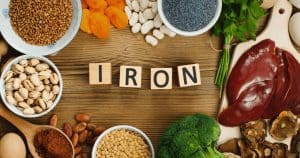
There are many important components of blood, one of them being iron. Your body needs iron in order to make hemoglobin, which is a part of red blood cells responsible for the transport of oxygen and carbon dioxide.
Iron Deficiency
If the body doesn’t absorb its necessary amount of iron, it becomes deficient in iron. Negative symptoms will only appear when the iron deficiency has gotten so low that not enough normal red blood cells can be made to efficiently carry oxygen. This is a condition known as iron deficiency anemia. It is one of the most common nutritional deficiencies and the leading cause of anemia in the United States.
If you are interested in the recommended daily allowance for iron for people of all ages and genders, check out the Academy of Nutrition and Dietetics website for more information.
Symptoms of Iron Deficiency
- Fatigue
- Pale skin and fingernails
- Weakness
- Dizziness
- Headache
- Glossitis (swelling of the tongue)
Dietary Sources of Iron
There are two sources of iron: plant (non-heme) and animal (heme) sources. The body can more efficiently absorb iron from animal sources versus plant sources. Some of the best animal sources of iron include:
- Lean beef
- Oysters
- Chicken
- Turkey
While plant sources of iron are absorbed less efficiently, it is still important to consume a variety of these nutrients. Add a source of vitamin C to your plant source of iron to enhance absorption. Good sources of vitamin C include citrus fruits, kiwi, strawberries, or bell peppers.
Some of the best plant sources of iron include:
- Beans and lentils
- Tofu
- Baked potatoes
- Cashews
- Dark green leafy veggies
- Fortified breakfast cereals
- Whole-grain and enriched breads
High-Risk Populations for Iron Deficiency
There are a few specific populations that are at a higher risk for developing iron deficiency:
Women Who Are Pregnant
Women who are pregnant experience an increase in blood volume, which requires higher iron levels to deliver adequate oxygen to the baby and assist with growing reproductive organs. Choose whole food sources of iron first and speak with a doctor before taking an iron supplement.
Young Children and Iron Levels
Babies have adequate iron stores for the first six months of life, after which their iron needs increase. Breast milk and iron-fortified formula are sufficient sources of iron, in addition to whole food sources. Cow’s milk is a poor source of iron and is not recommended for consumption until after one year of age. When too much milk is consumed at a young age (more than 24 oz. per day), it can take the place of other nutrient- and iron-rich foods, which may increase the risk of iron deficiency. Once a child has reached one year of age, it is recommended to keep cow’s milk consumption to 4 cups per day or less.
Adolescent Girls
Adolescent girls are at risk of iron deficiency based on rapid growth and dietary inconsistencies.
Women of Childbearing Age
Iron deficiency may develop in women of childbearing age who experience heavy or excessive menstrual periods.
How to Prevent Iron Deficiency
The best way to prevent an iron deficiency is to eat a balanced, healthy diet with a variety of iron-rich foods. If you do consume plant sources of iron, add a food source of vitamin C in the same meal to enhance absorption. Examples of this could be: adding bell pepper to a bean-based chili, drizzling lemon juice as a dressing on spinach salad, or topping a fortified cereal with fresh berries.
Embracing a Healthy Lifestyle with Elite Sports Clubs
The experts at Elite Sports Clubs are here to offer comprehensive wellness support. This includes access to our network of in-house dieticians who can help you achieve healthy iron levels. The initial consultation with an Elite nutritionist is free for members! Other health and wellness offerings include our group fitness classes, diet & nutrition workshops, The Wellness Lifestyle Challenge, the Healthycare 90-Day Program, full facilities access, physical therapy, and more. Contact one of our fitness experts for full details on our gyms and services. See today how Elite Sports Clubs can help you reach your wellness goals!
If you need help balancing your diet or are looking for ways to incorporate more iron-rich foods in your meals, schedule a FREE nutrition consultation with me!
Schedule a Nutrition ConsultationThe experts at
Written by Sarah Brunner, RDN, CD; Elite Sports Clubs Registered Dietitian
Sarah is certified in food allergies/intolerances and nutritional counseling, Academy of Nutrition and Dietetics; has a certificate in Dietetics from Mount Mary University; and a BA in Education and Mathematics from the University of Wisconsin – La Crosse.
